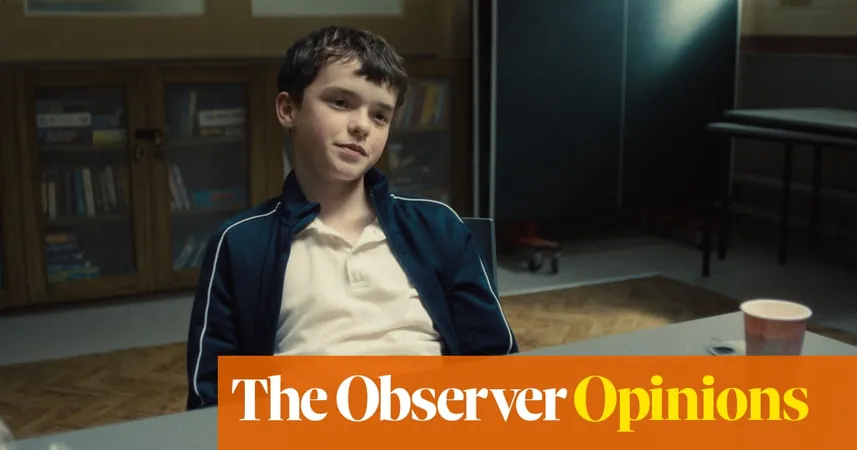
Are Smartphones the Silent Killers of Boys’ Mental Health? A Deep Dive into the Digital Age Dilemma
2025-03-23
Author: Ling
Introduction
In an age where screen time has become the new norm, a provocative new Netflix series called *Adolescence* has sparked crucial conversations about the alarming impact of online influences on young boys. The show explores the harrowing path of radicalization that can arise from the seductive rhetoric of men's rights activists (MRAs) like Andrew Tate. Keir Starmer, leader of the UK's Labour Party, weighed in on the discourse, noting that the series sheds light on an “emerging and growing problem” that needs urgent political action.
Impact of 'Adolescence' on Policy
While it might seem outlandish for policy decisions to be shaped by popular media, the impact of *Adolescence* cannot be underestimated. This fictional narrative has ignited a discussion that could catalyze legislative changes to combat rising misogyny and mental health issues among boys, a demographic significantly shaped by their online environments.
Two Perspectives on the Crisis
The series raises two significant arguments regarding the causes of this troubling trend. One perspective suggests that the crisis stems from an “epidemic of fatherlessness” coupled with diminishing community engagement, as highlighted in Gareth Southgate’s recent Dimbleby lecture. Young boys today are reportedly spending less time in structured environments such as youth centers and sports leagues where they might find positive male role models. As a result, they turn to the internet to fill that void, often encountering harmful ideologies that prey on their insecurities.
Conversely, the second argument asserts that the real threat lies within the digital landscape created by charismatic yet toxic influencers. The protagonist in *Adolescence*, who is drawn to MRA culture despite a seemingly supportive and nurturing family, exemplifies this struggle. The show illustrates how a stable upbringing does not insulate boys from the destructive allure of online radicalization. As writer Jack Thorne expresses, “The difference was that I had Terry Pratchett and Judy Blume, while he had the internet.”
Proposed Solutions
The discussion then pivots to potential solutions. Proponents of community investment advocate establishing mentoring programs and bolstering youth centers, believing that providing real-world role models can divert boys from harmful online ventures. However, the effectiveness of such initiatives is questionable. With technology companies tirelessly working to engage users, online platforms are often more compelling than any real-life alternative.
The Allure of Online Engagement
Remarkably, a survey revealed that a staggering 40% of 14- to 17-year-olds spend at least six hours a day online—a figure that mirrors a full school day. Social media is designed to offer instant gratification through gamified interaction, monopolizing their attention and diminishing the allure of offline socialization.
The Role of Radicalization
The sheer amount of time spent online is contributing to a fertile ground for radicalization. MRA culture thrives on obsessive status-anxiety, often exacerbated by social media dynamics. In the digital realm, ego bruises can result in lasting psychological scars, while offline interactions naturally offer moments of resilience and recovery. Consequently, users become vulnerable to the promises of influencers who offer validation and solutions for their deep-seated frustrations.
The Internet as a Grievance Amplifier
Moreover, the internet serves as a grievance amplifier, connecting individuals with incendiary content that fuels anger and validates their resentments. This environment has allowed figures like Tate to flourish, fulfilling a niche that intertwines the quest for status with a framework for discontent.
Need for Regulation
With these complexities in mind, one can’t help but wonder whether it is time for governments to take definitive steps towards regulating teenage social media access. Earlier this month, efforts to draft a bill aimed at curtailing addictive algorithms for young users faced setbacks, a move many see as a potential misstep in addressing this burgeoning crisis. Meanwhile, countries like France, Norway, and Australia are already experimenting with social media bans for minors, a strategy that might be worth considering for the UK.
Conclusion
As we navigate this digital age, it is imperative that both parents and policymakers take decisive action to safeguard the mental health of young boys. As the discussion sparked by *Adolescence* continues to unfold, one truth remains evident: the battle for their minds is a war worth waging.




 Brasil (PT)
Brasil (PT)
 Canada (EN)
Canada (EN)
 Chile (ES)
Chile (ES)
 Česko (CS)
Česko (CS)
 대한민국 (KO)
대한민국 (KO)
 España (ES)
España (ES)
 France (FR)
France (FR)
 Hong Kong (EN)
Hong Kong (EN)
 Italia (IT)
Italia (IT)
 日本 (JA)
日本 (JA)
 Magyarország (HU)
Magyarország (HU)
 Norge (NO)
Norge (NO)
 Polska (PL)
Polska (PL)
 Schweiz (DE)
Schweiz (DE)
 Singapore (EN)
Singapore (EN)
 Sverige (SV)
Sverige (SV)
 Suomi (FI)
Suomi (FI)
 Türkiye (TR)
Türkiye (TR)
 الإمارات العربية المتحدة (AR)
الإمارات العربية المتحدة (AR)